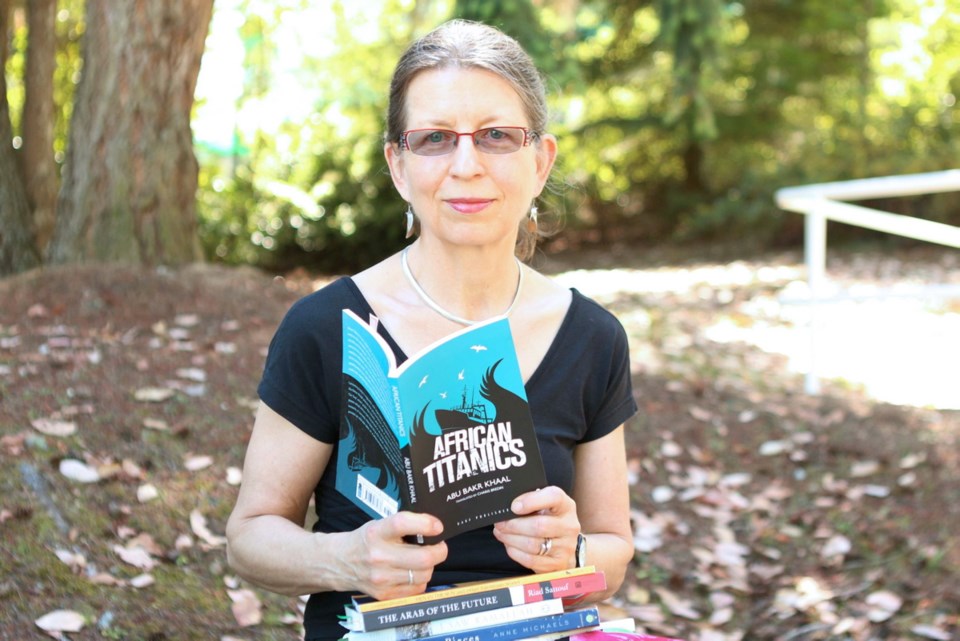A new literature is arising, born in the refugee experience of dislocation instead of geographically stable cultures, a Vancouver Island University English professor says.
Prof. Katharina Rout, who is about to teach a new course on refugee literature at the university’s Nanaimo campus, said the days when modern English fiction could be neatly deposited in categories such as American, Canadian or British are receding.
Now, writing is just as likely to be traced to a single experience, such as the confusion and privation of being forced to flee a homeland. It is also often first described in languages other than English and translated. Or it is by people whose native language is other than English.
“We might have an Iraqi author who fled Iraq and made it to Finland who writes in English,” Rout said. “The story can take place in the Balkans and describe the experience of refugees who try to make it to Germany.
“Now, is that English literature or German literature or is that Finnish literature?” she asked. “The old categories don’t help us so much anymore.”
But Rout said the cross-pollination of language, culture and experience leads to a richness in stories and themes told in the English language. “So we are now talking about trans-national literature as a concept,” she said. “We also have a new understanding of what we call world literature.”
However, cross-pollination of language and culture has been a celebrated element of English literature for decades, even centuries, Rout added.
Writers such as Joseph Conrad, originally Polish, produced English literature classics including Heart of Darkness and Lord Jim. Vladimir Nabokov, a Russian refugee from the Bolshevik revolution, wrote English classics such as Lolita.
Furthermore, translated works have given English-language literature some of its most notable works. Writers including Tolstoy and Kafka have hugely enriched all literatures, including that written in English.
Recently, places formerly colonized by Britain, such as Africa and India, have unleashed new literary voices. They speak from their own culture and experience, and their works are written in English.
Even the refugee experience has been a universal theme for centuries in all Western cultures.
Think of Homer’s Odyssey, in which the hero, Odysseus, journeys across the sea looking for his home. Then there is Virgil’s Aeneid, which tells how Trojan refugees fleeing the fall of Troy become the first Romans.
But now, Rout said, because of warfare and climate change, the world is likely to see many more hundreds of thousands of refugees looking for safety and security.
It is an experience with which Canada is already familiar, after opening its doors to Vietnamese boat people in the 1970s and 1980s. That experience has already inspired a little book, Ru, by Kim Thuy, who landed as a refugee in Quebec. Thuy wrote her book in French and it has since been translated into English.
Rout said reading Thuy’s book raised a question she had never before considered. Just what does it feel like to be on the receiving end of well-meant hospitality or generosity?
Rout has experience teaching literature arising from cultures other than those that are English-speaking. Several years ago, she taught courses in Arabic literature.
Those classes were fascinating, she said, because they drew a cross-section of students, from the Middle East to mainstream Canada. Class discussions were always lively and enlightening.
She hopes once again to attract a good cross-section of students with a wide variety of cultural and linguistic backgrounds for the course on refugee literature.
“People who otherwise might not talk to each other might start listening and learning from each other,” Rout said.
“If literature can help facilitate that, we won’t just get the stories as they are printed. We will also get those stories as they are lived around us.”
To learn more about Rout’s course, go to Vancouver Island University’s website, viu.ca, and search for Engl 327, Topics in International Literature, or contact Rout directly at Katharina.Rout@viu.ca.
